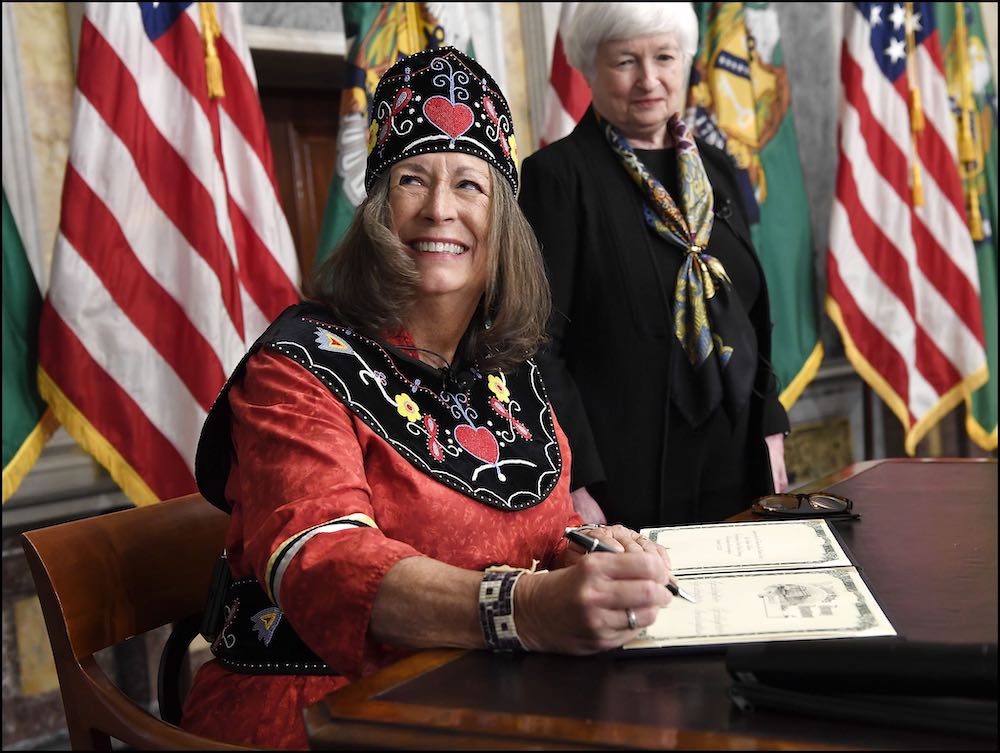
- Details
- By Brian Edwards
- Finance
U.S. Treasurer Chief Marilynn "Lynn" Malerba, the first Native American to hold the position, is stepping down this week after overseeing significant expansions in tribal economic development and investment programs during her two-year tenure at the Department of Treasury.
Malerba made her decision to step down ahead of the 2024 election, according to sources familiar with the timing.
The lifetime chief of The Mohegan Tribe in Connecticut, Malerba realized a long-held vision as Treasurer: creating Treasury's first Office of Tribal and Native Affairs, which she had advocated for both as a tribal leader and member of the Treasury tribal advisory committee. Under her leadership, the office helped administer $30 billion in economic recovery funds, including $20 billion for tribes through the American Rescue Plan — the largest single investment in tribal nations in U.S. history.
When offered the historic appointment in 2021, Malerba acknowledged feeling some intimidation, but saw a greater opportunity. "It was a space that Indigenous people have not been represented in, and that's really very special to me, to be able to be the person that would then bring our voice forward in a bigger way," she said during a press call Wednesday, reflecting on her tenure at Treasury.
As Mohegan's first female chief, Malerba brought a unique perspective to the role of Treasurer. Prior to her appointment, she served as a critical care nurse and held various tribal government positions, including executive director of health and human services and chair of the Mohegan Tribal Council.
At Treasury, she helped the agency reach a milestone of more than $500 million in State Small Business Credit Initiative (SSBCI) Capital Program approvals for tribal nations, including an $83 million allocation for a consortium of 125 Alaska tribes. These investments are expected to leverage up to $5 billion in additional financing for Native entrepreneurs and small businesses.
"When barriers to economic development are eliminated, tribal communities will thrive and prosper," Malerba said during her 2022 swearing-in ceremony. "We know, when there is robust tribal economic development, our local and state communities prosper as well."
Malerba credited Treasury Secretary Janet Yellen's active partnership as crucial to advancing Native economic interests. "It takes political will to change anything," Malerba said during the press call. "Having leadership that says, 'Yes, we want to make a change, we know that things need to change,' made a difference for us ... They made sure that every office and Bureau knew that their priority was to have equitable tax policy for tribes and to spur economic development."
Last month, Secretary Yellen presented Malerba with the Alexander Hamilton Award, the Treasury's highest honor for exceptional service to the agency’s mission.
Looking ahead, Malerba said she envisions the Office of Tribal and Native Affairs continuing its work to educate Treasury offices and reduce barriers to economic development on tribal lands through robust consultation practices and engagement with the Treasury Tribal Advisory Committee. The office, led by career federal employee Fatima Abbas (Haliwa-Saponi), will continue its bipartisan work supporting tribal inclusion, according to a senior Treasury official, who noted the office will focus on program compliance support as the $30 billion in recovery funds move into their closeout phase.
During her time as Treasurer, Malerba maintained her position as lifetime chief of the Mohegan Tribe, which consists of approximately 2,400 Native citizens. Her signature appeared on U.S. currency alongside Yellen's, marking two historic firsts: the first time two women's signatures appeared together on U.S. currency, and the first time a tribal leader's name was featured on American money. For Malerba, having her signature on U.S. currency represents more than a historical milestone — it carries a message about representation and possibility for future generations.
"We are all part of this country. We walk in two worlds," Malerba said. "The fact that there is an Indigenous person on the money for the first time is probably long overdue."
She noted that even her grandchildren now ask "Is this a Lynnie dollar?" — a reference to her family nickname — when handling currency that has her signature on it. "I hope that it tells people that where you begin isn't always where you end up," she said. "You should allow yourself the adventures that might come your way and have faith that good things can happen."
After she leaves the Treasury on Friday, Malerba will return to Connecticut to resume her role as lifetime chief. "One of the things I'm really looking forward to is doing immersion classes in Mohegan language, and really being able to spend time doing more cultural work as opposed to policy work," she said.
"My message to young Native women is when an opportunity presents itself, say yes," Malerba added. "If you're invited to have a seat at the table, please take it and have confidence in your voice, because we all have different lived experiences, but we all bring something to the table."
